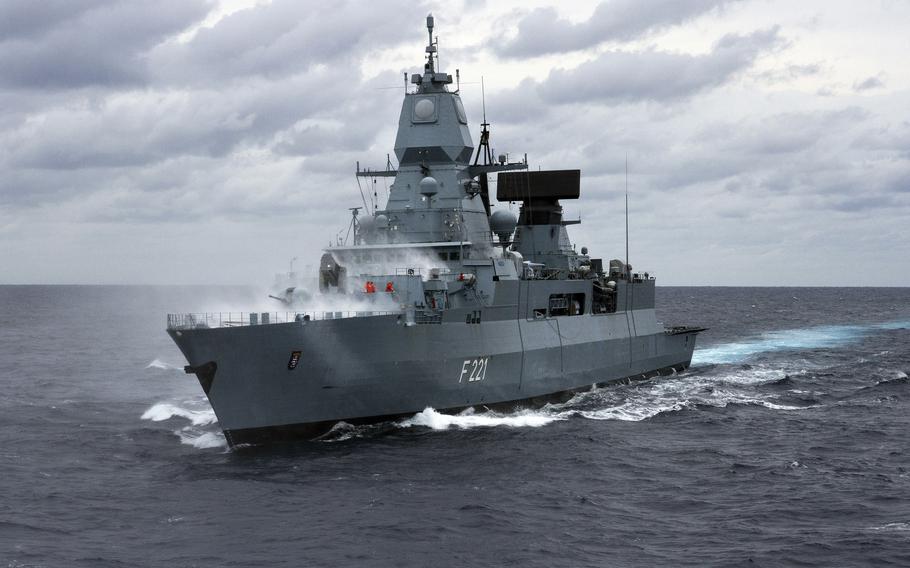
The German navy frigate Hessen sails in waters off the East Coast of the U.S. in 2018. Hessen repelled two Houthi aerial drone attacks in the Red Sea on Tuesday, Feb. 27, 2024, the German Defense Ministry posted on X, formerly known as Twitter. (Jule Peltzer/German armed forces)
The recent downing of attack drones by a German ship in the Middle East likely marks the first known use of live weapons in combat by the country’s navy since it was rebuilt after World War II, a German expert on maritime security said Wednesday.
On Tuesday, the frigate Hessen repelled two separate aerial drone attacks in the Red Sea, the German Joint Forces Operations Command said in a post the same day on its X account.
At 8:09 p.m., the ship used a 76 mm onboard gun to shoot down an Iranian-backed Houthi aerial drone flying toward it, the German news website Der Spiegel reported Wednesday.
Minutes later, Hessen’s radar picked up a second drone, which was shot down by its close-in defense system, according to the Der Spiegel report.
That response is significant, said Sebastian Bruns, a senior researcher for Kiel University’s Center for Maritime Strategy and Security.
“I would even go so far (as) to say that it will go down in German naval history as the first shots fired in anger by one of our frigates” since the modern German navy was founded in 1956, Bruns said.
Hessen entered the Red Sea on Friday as part of the European Union’s Aspides mission to protect shipping in the vital waterway. The mission, which includes France, Greece and Italy, will coordinate with the U.S.-led Operation Prosperity Guardian, providing needed additional help against the Houthis.
On Tuesday, U.S. forces and a coalition warship shot down five Houthi one-way attack drones between 9:50 p.m. and 10:55 p.m., Sanaa time, U.S. Central Command said in a statement the same day.
The statement did not name the warship, but CENTCOM typically defers to the involved country to publicly identify itself.
Hessen’s participation in the EU mission is noteworthy, given that the German navy generally has been tasked with counterpiracy, antiterrorism, mine clearance and other low- to medium-intensity operations since 1991, Bruns said.
German participation in the mission follows a 2022 push by Chancellor Olaf Scholz to invest 100 billion euros in technology, equipment and personnel for the country’s defense.
At the same time, Scholz pledged to meet a key defense spending guideline used to gauge the resolve of allied countries in supporting collective NATO defense, though that goal has stalled.
“What the Hessen has been authorized to do is thus very significant, not just for Germany and the EU … but also for showing that ‘zeitenwende,’ (a turning point) is really here,” Bruns said.
On Saturday, U.S. and U.K. forces carried out counterstrikes on Houthi military operations that destroyed or damaged 17 targets at eight sites in Yemen.
Since Jan. 11, coalition and U.S. strikes have degraded or destroyed more than 150 missiles and launchers, including anti-ship land attack and surface-to-air missiles, Maj. Gen. Pat Ryder, a Pentagon spokesman, told reporters at a briefing Tuesday.
Coastal radar, air surveillance, communication systems, rotary wing aircraft and underground ammunition storage facilities are among other capabilities knocked down, he said.
But Houthi militants have continued their attacks, with some success in recent weeks. On Tuesday, a rocket fired off the coast of Yemen exploded off the side of an unidentified ship traveling though the sea, The Associated Press reported Wednesday. The crew and vessel were reported safe.
That followed a Feb. 20 strike by a Houthi-launched ballistic missile on a cargo ship carrying fertilizer. The attack badly damaged the vessel.
As of Friday, the abandoned ship was taking on water, prompting U.S. officials to warn of an impending environmental disaster, The New York Times reported the same day.
The Houthis have said they will continue their attacks on Israeli-affiliated ships in the Red Sea until there is a cease-fire in Gaza. U.S. officials have said the attacks have targeted ships with no apparent connection to Israel.